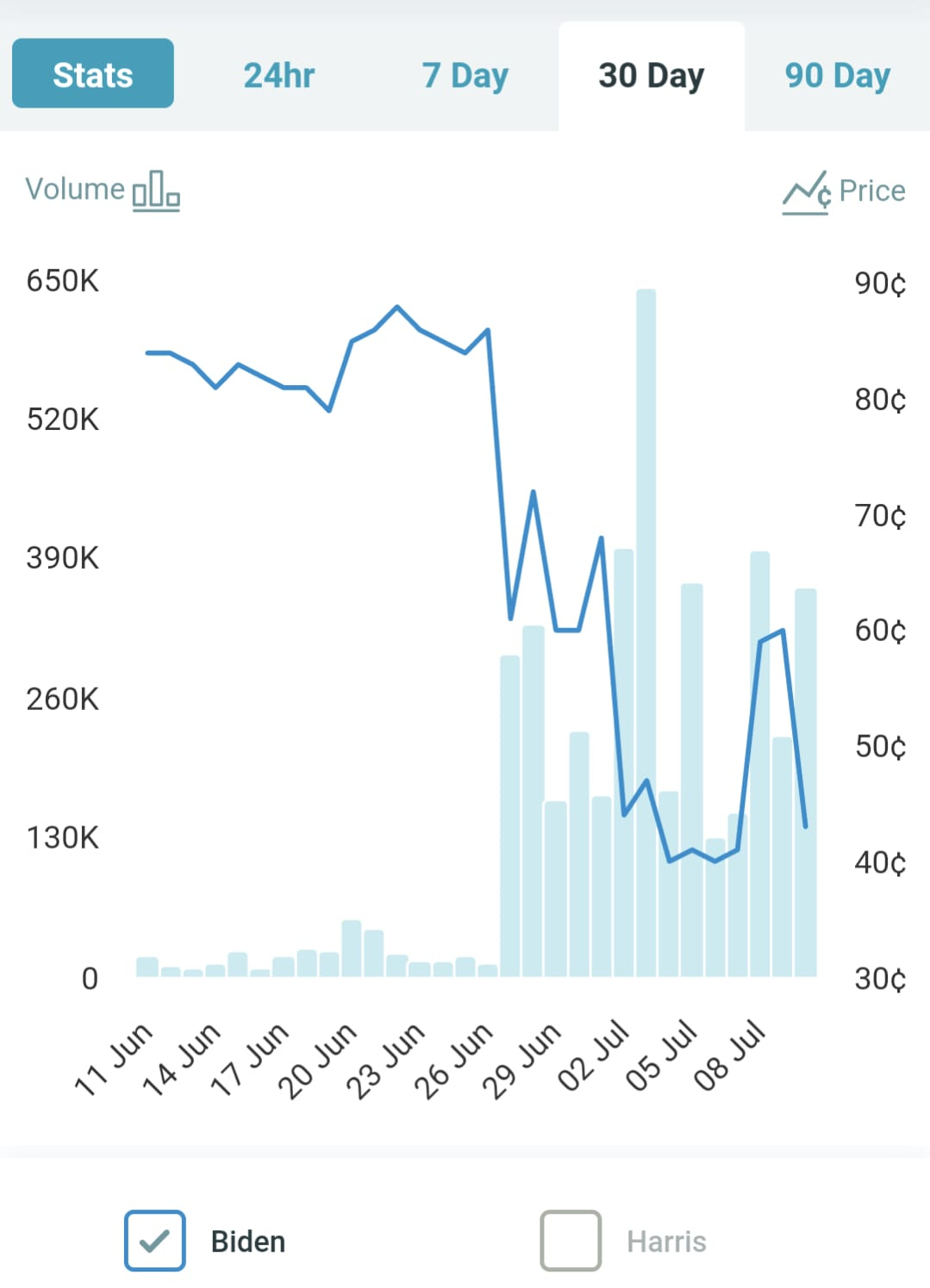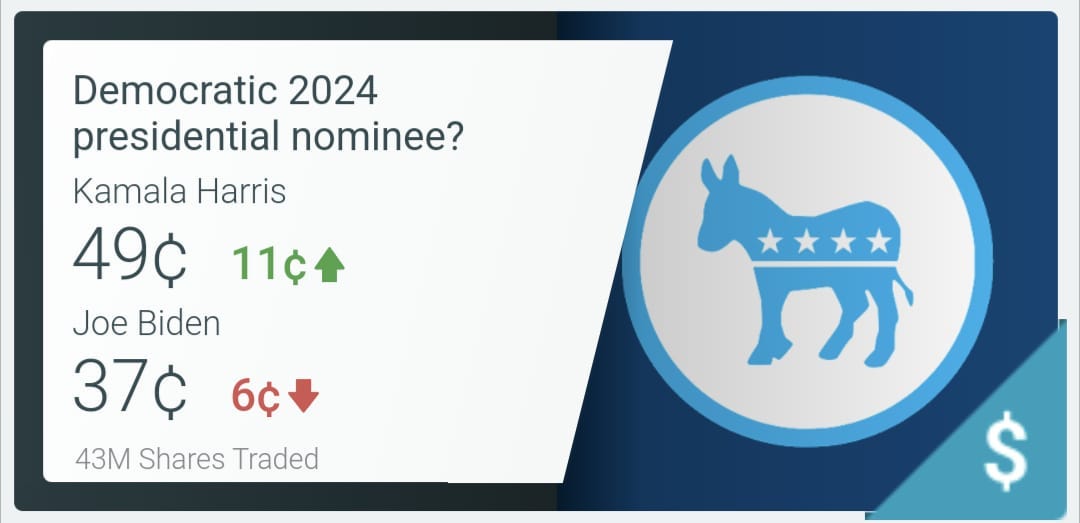Yves here. This post gives a tidy explanation of why Team Biden is so absolutely, no doubt about it, insistent that the President will remain the Democratic party candidate. It’s the confidence, or in some cases, the con, stupid. Candidates must look and act like winners even when they are floundering to preserve the possibility of turning things around.
What we are seeing now is the obverse of this dynamic, that when confidence flags, the worries cascade. Some press outlets tried to depict Biden’s “big boy” press conference performance as pretty good, despite several glaring gaffes like calling Zelensky “President Putin.” And in fairness, I regularly hear YouTubers make slip-ups, like calling Israel “Ukraine” when talk involved both countries, or less frequently, calling Russia “Ukraine” or vice versa. But I don’t recall them ever mis-assigning the names of leaders or prominent pols.
But in a sign of how Biden’s grip is slipping, CNN published this article right on the heels of the close of the press conference. That means it was substantially completed in advance and would have been significantly edited if the press confab was perceived to have gone particularly. In other words, the launch of the piece Obama, Pelosi privately expressed concerns over Biden confirms that Biden’s performance was not strong enough to change the trajectory. From the top:
Barack Obama and Nancy Pelosi have spoken privately about Joe Biden and the future of his 2024 campaign…
Democrats are desperate for the dispiriting infighting to end so they can get back to trying to beat the former president. And they’re begging either Obama or Pelosi to help them get there, aware that Senate Majority Leader Chuck Schumer doesn’t have the trust of Biden and that House Minority Leader Hakeem Jeffries doesn’t have the depth of relationship to deliver the message.
CNN spoke with more than a dozen members of Congress, operatives and multiple people in touch with both Obama and Pelosi, many of whom say that the end for Biden’s candidacy feels clear and at this point it’s just a matter of how it plays out, even after Thursday night’s news conference.
Ouch.
For a completely different sort of sanity check, I saw my dentist today. Remember I am on a secondary city in Thailand. He trained for many years in the US and speaks perfect English. As I was getting into the chair, he said, “Did you see Biden?” meaning the fresh press conference. He enumerated the flubs and continued:
If Biden was your neighbor, you could see something is not right with him. I don’t know why he is trying to run, except they have no one to replace him.
He then rattled though the weaknesses of the alternatives: Harris, Newsom, Pritzker.
After he cemented my crown, he remarked, “That will last longer than Biden.”
Another arena where this sort of confidence games operates routinely is in combat. That is why truth is famously the first casualty of war. Each protagonist tells its citizens that its victory is inevitable until it is pretty clear it is close to impossible.1 That dynamic has been evident in extreme form in the war in Ukraine. One part of the reason, as Alex Vershinin pointed out in a Royal United Services Institute article, is that the West has been conducting a coalition war. It’s necessary to keep even more potentially fractious parties on board, such as the reluctant Italians and the openly critical Hungarians. So keeping up the drumbeat of positive news and silencing or muffling dissent has been particularly important.
A second reason is the degree to which Ukraine’s allies underestimated Russia. No one expected a protracted conflict, let alone one in which Russia would bleed US/NATO armaments dry and even worse, demonstrate Russian superiority in many weapons categories. Finding themselves faced with a more formidable opponent than they ever expected, the Collective West is faced with the need to keep whipping up enthusiasm, for among other reasons to preserve funding, even as the recent set of elections in the EU show that strategy is no longer working.
By Rajiv Sethi, professor of economics at Barnard College. Originally published at his website
There are some events whose likelihood of occurrence is independent of beliefs about this likelihood. It may or may not rain during the opening ceremonies of the Paris Olympics, but the probability that it will is unaffected by whether people consider the possibility likely or unlikely.
Elections are different. If a perception starts to take hold that a candidate is losing viability, this will depress morale, fundraising, volunteer effort, and turnout among supporters, and thus increase the objective probability of a loss. Pessimism about a candidate can become a self-fulfilling prophecy.1
This is why campaigns tend to release internal polls selectively, circulating those showing their candidate ahead or closing the gap and suppressing those that interfere with this narrative. It is also why observers tend to be skeptical of internal polls, and even to interpret the failure of a campaign to release a poll for an extended period of time as a sign of bad news.
When a campaign is facing an existential crisis, it becomes strategically important for the candidate and committed allies to project a very high level of confidence in recovery. This is the script we have seen play out over the past few days. In his letter to members of congress, President Biden asserted that he could not and would not step aside, that any “weakening of resolve or lack of clarity” would only benefit his opponent, and that that it was time for the speculation to end. He made similar claims in a call with major donors and fund-raisers, and in a media appearance.
Several surrogates have echoed these sentiments, none more spectacularly than Representative Ocasio-Cortez, who insisted that the matter is now closed (screenshot below, link to video here):
This strenuous effort by the president and his allies did indeed shift beliefs about the his prospects, but only temporarily:

The figure above shows daily closing prices for the Biden nominee contract on PredictIt over the past month. Four phases can be identified. Prior to the debate the implied likelihood that Biden would be the nominee was hovering at around 85 percent. This dropped to about 60 during the debate itself, and then fell further to 40 over the next few days. The attempt to persuade the electorate that there was no possibility of Biden stepping aside led to a recovery in prices back to an implied probability of about 60, but this held for just a couple of days. As of this writing, the price is as low as it has ever been:

So we are faced with two inconsistent narratives. The president and his committed supporters insist that there is no prospect of his stepping aside, that the matter is closed. Markets suggest that a change of nominee is more likely than not, and that Kamala Harris has a better chance of contesting the November election than Biden himself.
How do we make sense of this? Statistical models cannot help us figure out a probability, since they are unable to cope with uncharted waters and are still assigning zero probability to the event that someone other than Trump or Biden will win the November election.
It helps to realize that the president currently has only two options—he can either start preparing to step aside and signal that he is doing so, or proclaim with supreme confidence that such a situation could never arise. It is inconceivable to me that his supporters really do believe that the matter is closed. But they have no choice. Leaving the door open even slightly would be fatal for the campaign, as a very public and chaotic battle over the path ahead will erupt.
Hence the president and his supporters will continue to make strenuous effort to convince donors, delegates, and the electorate at large the that there is absolutely no chance of his dropping out of the race. Perhaps this will work, and the probability that he will prevail will creep back up to pre-debate levels over time. But what markets are saying at the moment is that the effort will very likely fail.
In public-facing messages, the campaign has to keep projecting the utmost confidence. But behind closed doors, it would be wise for party leaders, starting with the president himself, to begin planning for an orderly transition. This must be done even if they hope that the plans will never need to be implemented, and even if the plans must—for strategic reasons—be kept hidden from the public.


